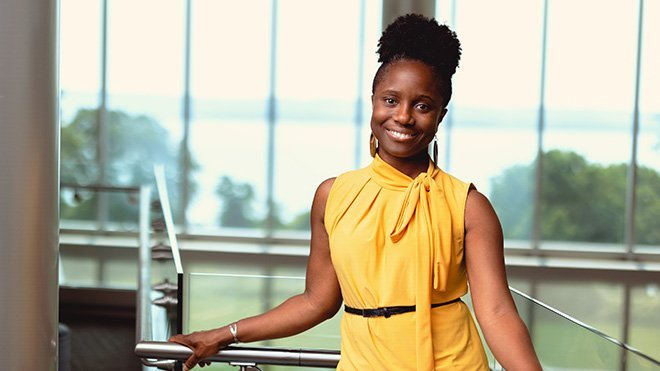Gentles-Peart Receives Fulbright Scholar Award to Research Black Body Politics
Kamille Gentles-Peart’s reparative justice scholarship aims to center and amplify the lives and experiences of Black women in postcolonial Caribbean countries

BRISTOL, R.I. – Roger Williams University professor Kamille Gentles-Peart has been named a Fulbright Scholar by the U.S. Department of State and the Fulbright Foreign Scholarship Board to continue her research on how Black women engage with and survive attitudes and practices surrounding curvy Black female bodies in “postcolonial” Caribbean countries.
During the 2023-24 academic year, Gentles-Peart, a professor of Communication Studies at RWU, will explore the ways in which race, gender, nationality, and body aesthetics influence Black women’s lives in Trinidad and Tobago. Specifically, she will examine how Black women navigate the conflicting discourses of a lingering colonial legacy that favors Eurocentric body ideals and the Afro-Caribbean celebration of voluptuous Black female bodies.
“Since white Europeans encountered Black women in Africa during colonial times, Black women’s bodies, especially curvy ones, have been denigrated and marginalized. These Eurocentric practices and ideologies continue to shape Black women’s contemporary experiences, even in Afro-descendent societies in the Americas where voluptuous Black female bodies are more celebrated, such as the Caribbean. Yet, the everyday experiences of Black women who actually live in societies with these conflicting ideas have not received much attention,” Gentles-Peart said. “Through a Black feminist lens, my work aims to center and amplify the voices and experiences of Black women who have to navigate these body politics, exploring how they are recuperating the narrative and value of their bodies, and ultimately helping to create a space and platform where we can challenge and repair the negative impact of colonialism by foregrounding Black women as knowledge producers.”
Gentles-Peart is the tenth faculty member at Roger Williams to be named a U.S. Fulbright Scholar or Fulbright Visiting Scholar.
“Dr. Gentles-Peart contributes justice-based work that illuminates the untold stories and underrepresented voices of Black women and brings their experiences front and center into the discourse of academia,” said RWU Provost and Senior Vice President for Academic Affairs Margaret Everett. “A Fulbright Scholar award not only enriches faculty teaching and research, but also honors the critical work and important contribution that Dr. Gentles-Peart is making to create a more informed and inclusive society.”
For the past 10 years, Gentles-Peart has pursued research into the lives of Black women in Caribbean countries, previously in Jamaica and Barbados, and their diasporas. She has authored a book, Romance With Voluptuousness: Caribbean Women and Thick Bodies in the United States, and articles on this topic in Feminism and Psychology, Women’s Studies Quarterly, and in “The Routledge Companion to Beauty Politics.” She also co-created and co-directs the North Star Collective, a regional consortium to promote reparative justice and uplift faculty of color at the New England Board of Higher Education.
As a Fulbright Scholar, Gentles-Peart is expanding her work to Trinidad and Tobago, an island chain in the Anglophone Caribbean with a population of 1.3 million, predominantly African and Indian communities, which gained its independence from the United Kingdom in 1962. The University of the West Indies in St. Augustine, Trinidad, will serve as host institution throughout her research.
“Having the support of the U.S. Fulbright Scholars Program will allow me to spend time on the ground, in the country, and really immerse myself in the lives of Black women and talk to them in the context of their work, their homes, where they eat, and shop. I get to experience their culture to gain a deeper understanding of the everyday lives of Black women in this society,” Gentles-Peart said. “Through ethnographic research and in-depth interviews, these women can share their voices and their stories so that their experiences and narratives regarding body politics can come into sharper focus in the academic world.”